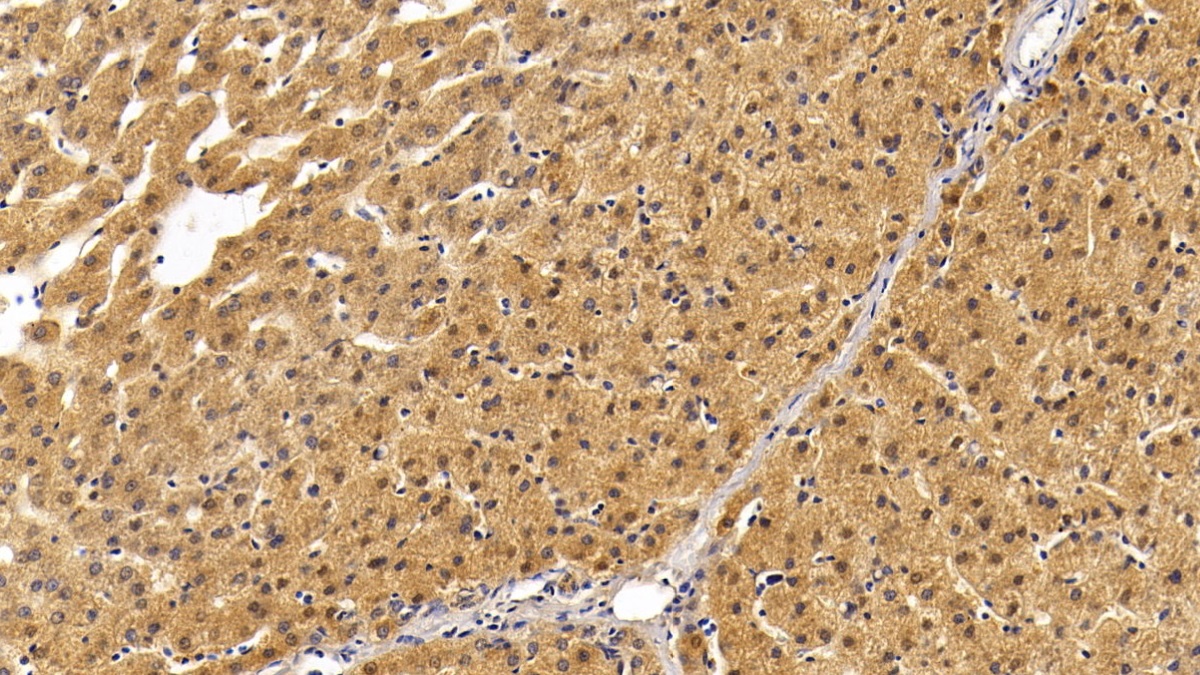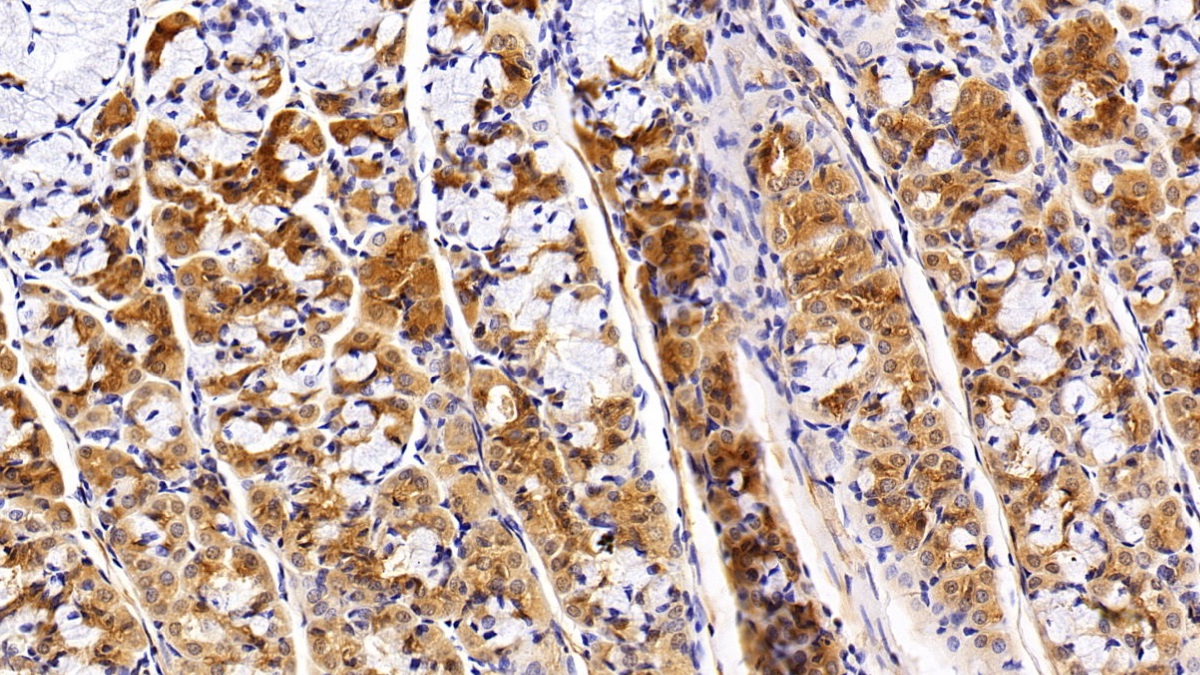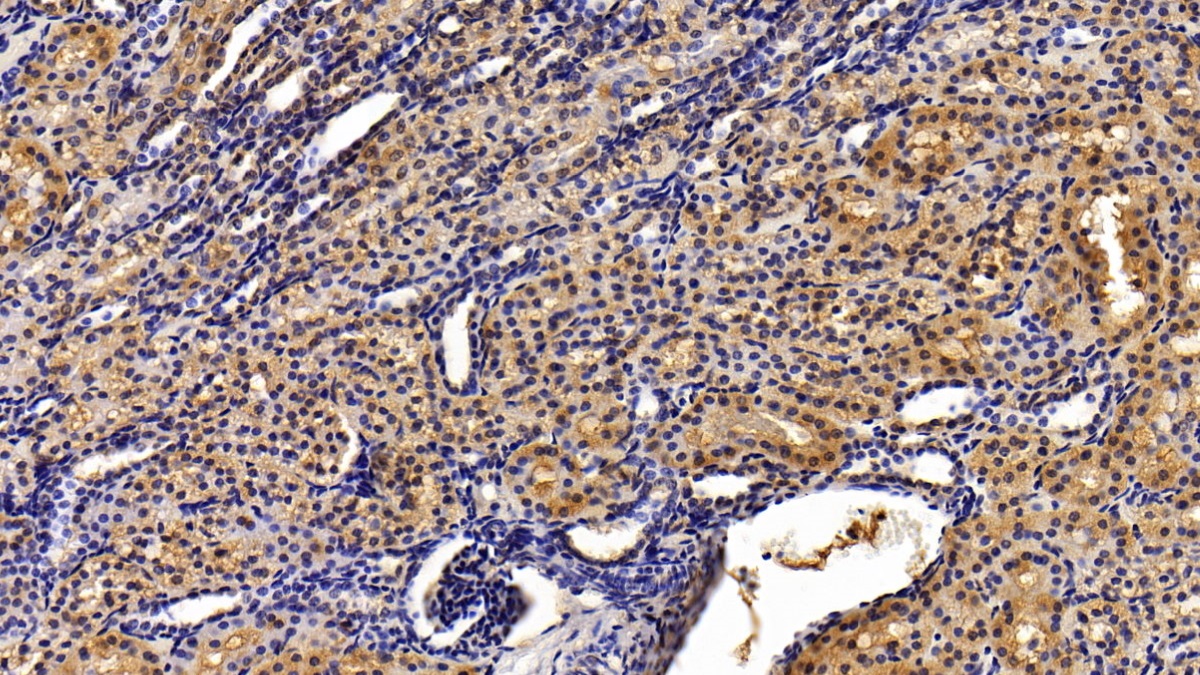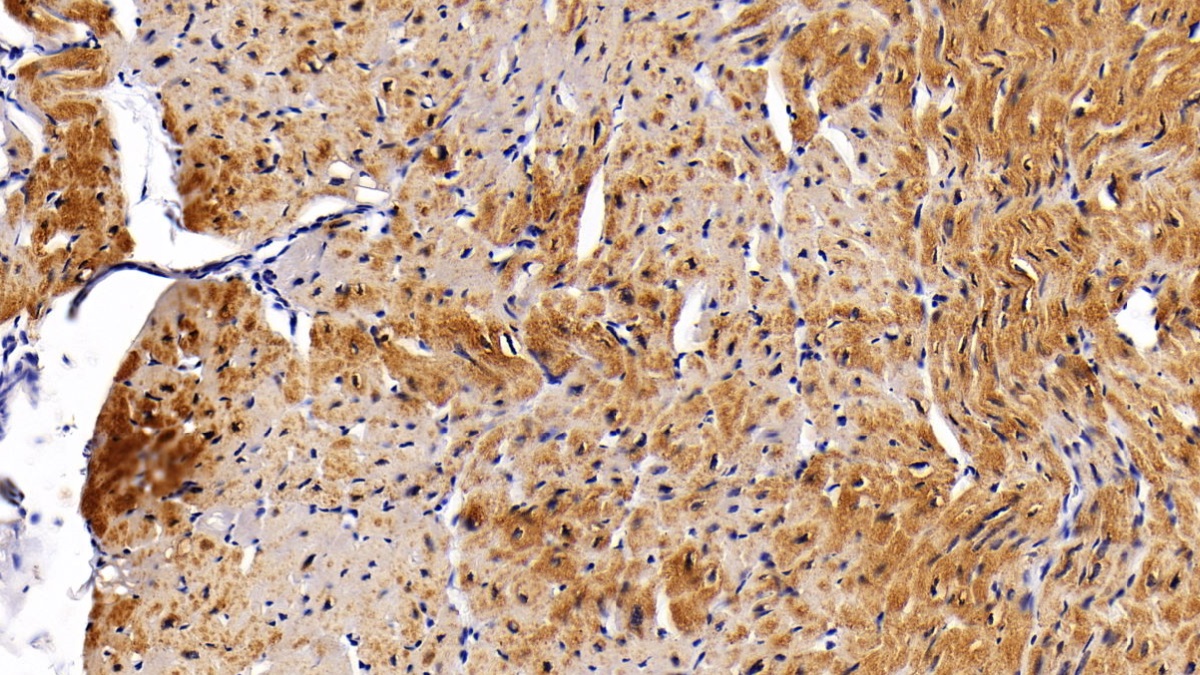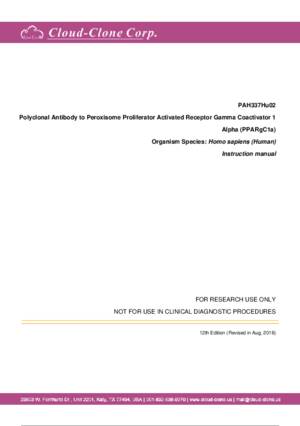Polyclonal Antibody to Peroxisome Proliferator Activated Receptor Gamma Coactivator 1 Alpha (PPARgC1a)
LEM6; PGC-1(alpha); PGC-1v; PGC1; PGC1A; PPARGC1; Ligand effect modulator 6
- Product No.PAH337Hu02
- Organism SpeciesHomo sapiens (Human) Same name, Different species.
- SourcePolyclonal antibody preparation
- HostRabbit
- Potencyn/a
- Ig Type IgG
- PurificationAntigen-specific affinity chromatography followed by Protein A affinity chromatography
- LabelNone
- Immunogen RPH337Hu02-Recombinant Peroxisome Proliferator Activated Receptor Gamma Coactivator 1 Alpha (PPARgC1a)
- Buffer FormulationPBS, pH7.4, containing 0.02% NaN3, 50% glycerol.
- TraitsLiquid
- Concentration0.5mg/mL
- Organism Species MoreSus scrofa; Porcine (Pig)
- ApplicationsWB; IHC; ICC; IP.
If the antibody is used in flow cytometry, please check FCM antibodies. - DownloadInstruction Manual
- UOM 20µl100µl 200µl 1ml 10ml
- FOB
US$ 109
US$ 253
US$ 362
US$ 905
US$ 3620
For more details, please contact local distributors!
SPECIFITY
The antibody is a rabbit polyclonal antibody raised against PPARgC1a. It has been selected for its ability to recognize PPARgC1a in immunohistochemical staining and western blotting.
USAGE
Western blotting: 0.01-2µg/mL
Immunohistochemistry: 5-20µg/mL
Immunocytochemistry: 5-20µg/mL
Optimal working dilutions must be determined by end user.
STORAGE
Store at 4°C for frequent use. Stored at -20°C in a manual defrost freezer for two year without detectable loss of activity. Avoid repeated freeze-thaw cycles.
STABILITY
The thermal stability is described by the loss rate. The loss rate was determined by accelerated thermal degradation test, that is, incubate the protein at 37°C for 48h, and no obvious degradation and precipitation were observed. The loss rate is less than 5% within the expiration date under appropriate storage condition.
GIVEAWAYS
INCREMENT SERVICES
-
 Antibody Labeling Customized Service
Antibody Labeling Customized Service
-
 Protein A/G Purification Column
Protein A/G Purification Column
-
 Staining Solution for Cells and Tissue
Staining Solution for Cells and Tissue
-
 Positive Control for Antibody
Positive Control for Antibody
-
 Tissue/Sections Customized Service
Tissue/Sections Customized Service
-
 Phosphorylated Antibody Customized Service
Phosphorylated Antibody Customized Service
-
 Western Blot (WB) Experiment Service
Western Blot (WB) Experiment Service
-
 Immunohistochemistry (IHC) Experiment Service
Immunohistochemistry (IHC) Experiment Service
-
 Immunocytochemistry (ICC) Experiment Service
Immunocytochemistry (ICC) Experiment Service
-
 Flow Cytometry (FCM) Experiment Service
Flow Cytometry (FCM) Experiment Service
-
 Immunoprecipitation (IP) Experiment Service
Immunoprecipitation (IP) Experiment Service
-
 Immunofluorescence (IF) Experiment Service
Immunofluorescence (IF) Experiment Service
-
 Buffer
Buffer
-
 DAB Chromogen Kit
DAB Chromogen Kit
-
 SABC Kit
SABC Kit
-
 Long-arm Biotin Labeling Kit
Long-arm Biotin Labeling Kit
-
 Real Time PCR Experimental Service
Real Time PCR Experimental Service
| Magazine | Citations |
| Coronary Artery Disease | Impaired myocardium energetics associated with the risk for new-onset atrial fibrillation after isolated coronary artery bypass graft surgery Pubmed: 24463787 |
| Molecular and cellular biochemistry | Skeletal muscle mitochondrial dysfunction precedes right ventricular impairment in experimental pulmonary hypertension Pubmed: 23099843 |
| Diabetes. | Inorganic nitrate promotes the browning of white adipose tissue through the nitrate-nitrite-nitric oxide pathway Pubmed:25249574 |
| Psychoneuroendocrinology | Maternal stress predicts altered biogenesis and the profile of mitochondrial proteins in the frontal cortex and hippocampus of adult offspring rats PubMed: 26143539 |
| Biochemistry (Moscow) Supplement Series B: Biomedical Chemistry | The level of circulating PGC1α in cardiovascular diseases Article: 10.1134 |
| Neuroscience Letters | Unlike PPARgamma, neither other PPARs nor PGC-1alpha is elevated in the cerebrospinal fluid of patients with multiple sclerosis pubmed:28483651 |
| The American Journal of the Medical Sciences | Serum peroxisome proliferator-activated receptor gamma coactivator-1α related to myocardial energy expenditure in patients with chronic heart failure Doi: 10.1016/j.amjms.2018.12.002 |
| Brain Research | The effect of antecedent-conditioning high-intensity interval training on BDNF regulation through PGC-1α pathway following cerebral ischemia Pubmed: 31866362 |
| Food & Function | Ubiquinol supplementation modulates energy metabolism and bone turnover during high intensity exercise Pubmed: 32797125 |
| Brown and beige adipose tissue regulate systemic metabolism to resist diet-induced obesity through metabolite signals in an inter-organ signaling axis | |
| CLINICAL NUTRITION | Long lasting protective EFFECTS of early L-ARGININE TREAMENT on ENDOTHELIUM in an in Vitro STUDY 33743287 |
| Nature Communications | Brown and beige adipose tissue regulate systemic metabolism through a metabolite interorgan signaling axis 33772024 |


